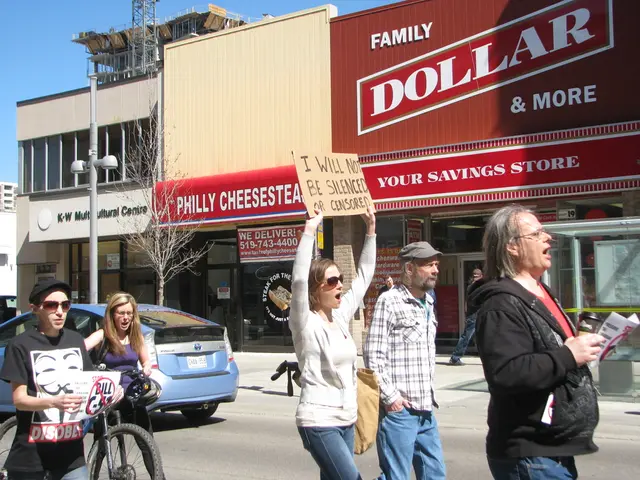Expanding Surveillance and Authoritarian Tactics in Modern-day Britain
In the 21st-century Britain, the landscape of policing is heavily influenced by political agendas, digital surveillance, and media narratives. In an engaging conversation, former police investigator turned truth-seeker Charles Malet joins forces with Dan Astin-Gregory to analyze the disturbing transformation of law enforcement in modern times.
The duo delves into the topic of political policing, which has escalated with the advent of digital policing and online safety bills, posing a serious threat to the freedom of expression on the internet. As a seasoned detective, Malet presents a distinct perspective on the decline of law enforcement standards and the long-term trends in legislation that steered the current scenario.
One of the seminal acts in the UK that paved the way for criminalizing online activities was the Public Order Act 1986. This legislation, with its focus on perceived harm over intent, has resulted in an environment where people can be arrested for trivial social media posts that may or may not cause any actual harm. Furthermore, this act created a slippery slope towards thought crimes and pre-crime, gradually shaping people's behavior and interactions.
The concept of intent is crucial, but this legislation turns the tables by focusing on perceived harm, which can lead to innocent people being labeled as wrongdoers. The culture of self-censorship has flourished as a result, making individuals wary of opening up about their thoughts for fear of causing offense or triggering backlash.
Digital media platforms have notably failed in their responsibility to manage online interactions effectively, which has resulted in many people taking on the role of internet "police." This situation has paved the way for over-reaching by law enforcement, creating a culture of thought police and enforcing digital rights heavy-handedly.
The popularization and increased reliance on social media have led to unresolved conflicts, polarization, bullying, and harassment. Individuals have become de-socialized from each other, leading to loneliness and polarized opinions. Now, as a result, police are finding themselves in uncomfortable roles - becoming surrogate parents or playground navigators on the internet.
Modern policing is challenged by the diverse interactions on social media, which are simultaneously entertaining, informative, and dangerous. The temporary nature of online content, mixed with extreme political leanings, can exacerbate conflicts and make resolution impossible. Additionally, the isolated nature of crouching over a mobile phone screen has significantly contributed to the escalation of conflicts and a lack of intervention.
In this brave new world, people have lost the ability to handle digital interactions harmoniously. The ever-advancing digital space has evolved beyond harmless interactions to become a hub for bullying, harassment, and conflict, which often spills over into real life. A single tweet can land an individual in legal trouble, highlighting the urgency to strike a balance between free speech and consequences.
The influence of political agendas and biased hierarchy within law enforcement has led to "two-tier policing" and a politicized enforcement system. Malet condemns the flawed system that biases towards certain groups or individuals based on whether their actions align with government policy or are deemed "progressive." This approach taints the legal system's very foundation, eroding public trust and creating division.
One notable example of this bias was the Southport murders and ensuing riots where intense scrutiny was placed on the police force, exposing political messaging and the destructive consequences of a corrupted system. These incidences strenuously remind us that the current system requires a radical overhaul to strike a balance between state, system, and individuals.
Overall, the digital age has necessitated an adjustment in approach to modern policing. The focus needs to be on real crimes and community safety rather than inflated online "thought crimes." As responsible citizens of our digital society, let's strive to navigate this realm in responsible, thoughtful, and collaborative ways.
Related Articles:
- Public Order Act 1986
- 'Zuby and Dan Astin-Gregory Talk Cultural Subjectivity'
- South Park Cartoon Characters like Eric Cartman
- In the modern era, the political agenda-driven restructuring of policing, digital surveillance, and media propaganda heavily impact the freedom of speech on the internet.
- The transformative effects of technology on law enforcement have made the impact of legislation like the Public Order Act 1986 more pronounced, criminalizing online activities and conflating perceived harm with intent.
- This focus on perceived harm rather than intent has fostered an environment where innocent people face the risk of being labeled as wrongdoers, leading to a culture of self-censorship.
- Online media platforms have abdicated their responsibility to manage digital interactions, forcing individuals to acts as substitutes for law enforcement, often leading to the enforcement of digital rights in an overbearing manner.
- Modern policing struggles to cope with the diverse and often damaging interactions on social media, where unresolved conflicts, polarization, bullying, and harassment have become prevalent.
- As a result of the digital age, the balance between free speech and consequences has become essential, with the digital realm evolving into a hub for bullying, harassment, and conflict, which can directly impact general-news, health-and-wellness, mental-health, crime-and-justice, and political discourse.








